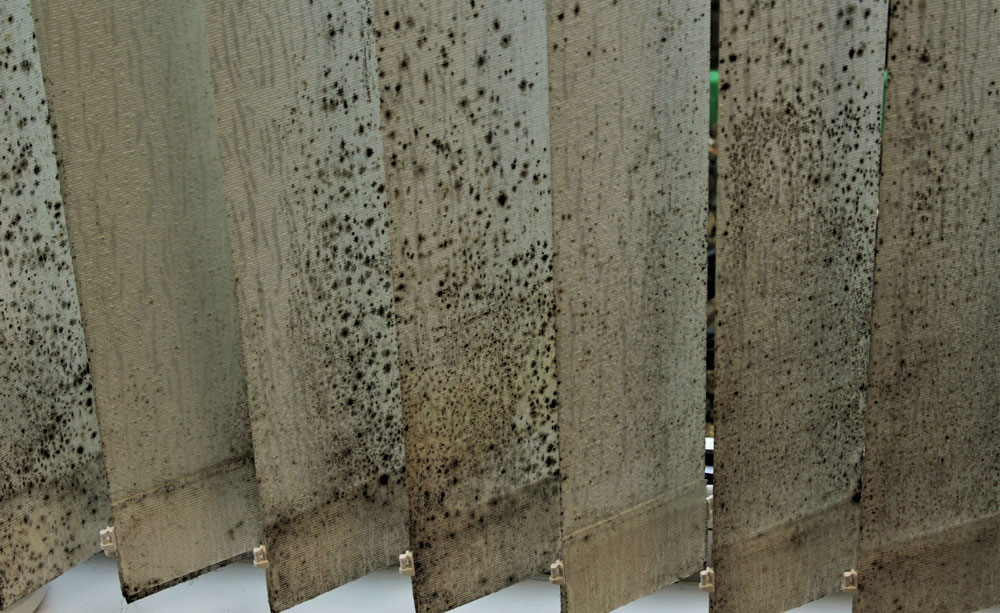How To Clean Mould Off Blinds
 CONTENTS
CONTENTS
- What causes mould on blinds?
- Is mould dangerous?
- How to remove mould from blinds
- How to prevent mould growing on blinds
- Get in touch
When mould starts growing on your blinds, it is not just an unsightly problem you are dealing with. It can produce an unpleasant, musty odour, put people’s health at risk, and could eventually spread throughout your property. You must bring in professional cleaners to remove the mould for you.
At ICE Cleaning, we offer an effective, thorough mould remediation service. Our technicians are accredited by Dewpoint Professional and have plenty of experience removing mould from the surfaces and the air in people’s properties.
Read on to find out why mould is growing on your blinds and how to get rid of it.
What causes mould on blinds?
Mould is caused by excess moisture. It can usually be found in properties with damp, condensation, and poor ventilation. One of the most common places to find mould growing is on windows and windowsills as condensation tends to form here and causes dampness.
As blinds are usually very close to and touch windows and windowsills, they are susceptible to getting mouldy. Blinds are also prone to trapping humid air next to the window, increasing the likelihood of condensation.
Blinds fitted in rooms which get particularly humid, like the bathroom and kitchen during cooking and washing, are especially prone to getting mouldy. This is because they can get damp from the steam and humidity, and lots of condensation will form on the windows.
Some types of blinds are more vulnerable to mould growth than others:
- Fabric blinds: Mould grows on organic materials, such as cotton and linen, so fabric is very susceptible to mould growing. It can stain, weaken, and destroy the fibres.
- Wood blinds: Wood absorbs moisture and therefore provides the optimal conditions for mould to grow. Overtime, mould will eat away at the wood and the blinds will deteriorate.
- Roller and Roman blinds: They are usually rolled up so they might not be able to fully dry out when they get wet.
As most blinds pull down, they can conceal the early signs of mould around the window and on the blinds, enabling it to become a serious problem before it is first spotted, as well.
Is mould dangerous?
Should you ingest, inhale, or touch mould spores, you could experience health problems. Mould releases allergens and irritants which could cause an allergic reaction like a stuffy nose, sneezing, and skin rashes. On occasion, it can release toxic substances.
Some groups are more vulnerable to mould exposure than others, such as elderly people, people with respiratory conditions, and people with a weakened immune system.
Mouldy blinds can be particularly hazardous because they tend to be in rooms like the bathroom, living room, and bedrooms which you spend lots of time in. You may also touch the mould a lot when opening and shutting blinds, or opening and closing windows.
How to remove mould from blinds
No matter how convincing online DIY mould removal methods sound, you must always bring in professional mould cleaners.
Firstly, blinds are very difficult to clean, regardless of whether mould is growing on them. While some types, like wood and PVC blinds can be wiped down quite easily, fabric blinds must be washed carefully according to the manufacturer's instructions.
Should you use the wrong kind of chemical to clean them, such as bleach, you could do more damage, such as staining the blinds.
Cleaning mould off blinds is especially challenging, too, depending on the material. Fabric, for instance, is a porous material so mould can grow deep into the surface, evade treatment, and then return after cleaning.
Attempting to clean mould yourself can also be hazardous. You will be putting yourself in close contact with the dangerous spores and without personal protective equipment (PPE) could inhale, ingest, and touch them.
Specialist cleaners, like our technicians, will have the specialist products and equipment to thoroughly clean mould from your blinds. They can remove all the spores without damaging your blinds and even advise on how to prevent the mould returning in the future.
How to prevent mould growing on blinds
- Open your blinds to encourage airflow and help get rid of any humid air and condensation
- Open your windows to ventilate the room and stop humidity building up
- Use extractor fans to get rid of any steam and humidity in the bathroom and kitchen
- Hang your blinds outside or over the window recess to enable airflow around the windows
- Consider mould-resistant blinds made of waterproof materials, like PVC
Get in touch
Our technicians are available nationwide, 24/7, 365 days a year. They can quickly make your property safe and clean, and significantly improve the air quality in your home. In an emergency, they can be on site in a matter of hours.
Contact us on 0208 066 0360 or at enquiries@icecleaning.co.uk to book our mould removal services today.

Speak with me today,
I’m here to help
By asking you a few questions either via phone or email I can immediately provide a realistic estimation of the cost.
You’re in good company. We’ve cleaned for the following commercial clients… View all

Why choose us?
- Cater to a wide variety of cleaning situations
- Nationwide coverage, available 24/7
- Cater to commercial and domestic clients
- Free survey provided prior to quotation
- Emergency response team
- Offer a bespoke service designed to suit all your needs
- All technicians hold professional health and safety qualifications, including BICSc, IOSH, Dewpoint Professional & Safe Contractor
We’re fully accredited
We place best practise, professional expertise and health and safety at the core of our business. We’re fully compliant with all legal obligations. You can view a list of our accreditations below, or visit our Health & Safety page for more information.











-RGB-small.1707319151.jpg)




















